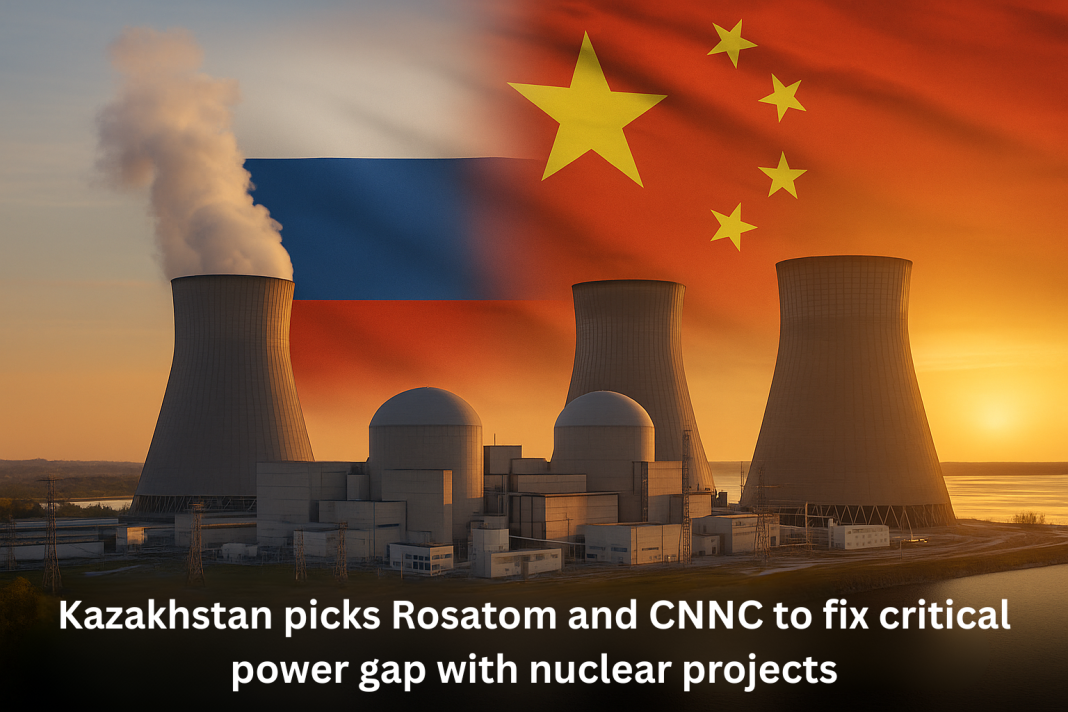Kazakhstan, a country rich in oil and gas, is starting a big and important project — it will build its first nuclear power plants. For this job, Kazakhstan has chosen two major partners: Rosatom, the state nuclear company from Russia, and CNNC, the government-run nuclear company from China.
Kazakhstan to Build Nuclear Power Plants for the First Time
Even though Kazakhstan is one of the world’s top producers of uranium — the metal used to fuel nuclear plants — it has not used nuclear power since 1999. That was the year when its last working nuclear reactor, the BN-350 located near the Caspian Sea, was shut down. Since then, most of Kazakhstan’s electricity has come from coal, with some help from water power and renewable sources like solar and wind energy.
In October, the people of Kazakhstan voted in favor of building new nuclear power plants. The decision was also supported by the country’s government. After the vote, Kazakhstan’s new atomic energy agency, formed in March, began to look at proposals from other countries to help build the power plants. Among the offers received, the agency picked Rosatom and CNNC as leaders of two separate groups, called consortiums, to carry out the work.
Russia’s Rosatom to Build Plant with Advanced Reactors
The first nuclear power plant will be built by Russia’s Rosatom. The plant will be located in Ulken, a village around 400 kilometers away from Almaty, the country’s largest city. This plant will have two reactors that use a technology called VVER-1200 Generation 3+. This is a modern Russian design that is already used in other parts of the world.
Azerbaijan Airlines Crash in Kazakhstan: 38 Dead, 29 Survive
Kazakhstan’s atomic energy agency said that Rosatom’s proposal was the “most optimal and advantageous” among all the bids. This means the Russian offer was seen as the best fit in terms of safety, design, and cost. As a next step, Kazakhstan and Russia will work together to arrange for state export financing from Russia to support the project.
The VVER-1200 reactors are known for their safety features and efficiency. These reactors are already operating in Russia and some other countries. Kazakhstan will now become one of the places where this technology is also used.
China’s CNNC to Lead Second Plant with Own Consortium
Along with the nuclear plant being built with Russia, Kazakhstan has also decided to build another one with help from China. This second project will be managed by a Chinese company called China National Nuclear Corporation (CNNC). Like Rosatom from Russia, CNNC is a company run by the Chinese government.
Kazakhstan’s nuclear agency said they are making a separate deal with CNNC for this project. They also said that China has the right technology and strong industries to help Kazakhstan build the plant properly.
So far, CNNC hasn’t made any public comments about the project. Also, Kazakhstan has not yet said where this second plant will be built, how many reactors it will have, how much it will cost, or how long it will take to finish.
Some companies from France and South Korea had also offered to help Kazakhstan build its nuclear power plants. But in the end, Kazakhstan picked Russia and China to be its main partners for this important work.
⚔️ Rising Lion Roars: Israel Launches First-Ever Coordinated Strike on Iran’s Nuclear Strongholds
Kazakhstan Strengthens Energy Ties with Russia and China
Kazakhstan is increasing its cooperation with both Russia and China in the energy sector. The country exports most of its oil through Russia, and both countries often talk about working together in the areas of energy and industry.
Recently, the nations held meetings to explore deeper partnerships on various energy-related projects. Around the same time, China also made agreements to purchase more gas and oil. In one case, China National Petroleum Corporation, the top energy company in the country, agreed to take more gas during 2024 and 2025. It also signed a deal to buy crude oil from Tengizchevroil, a company operating within the region.
These agreements show how Kazakhstan is working more closely with both of its large neighbors. And now, with the decision to build nuclear power plants with help from Rosatom and CNNC, these ties are expected to grow stronger.
As of now, Kazakhstan does not have any nuclear power stations running. With these two new projects, the country is beginning a new chapter in its energy story. The government has already said that it wants to generate 2.4 gigawatts of nuclear power by the year 2035.
But for now, the focus is on getting the help needed to build the plants. The two big projects — one with Russia and the other with China — mark a major step forward in Kazakhstan’s journey to bring nuclear energy back into use after more than two decades.
